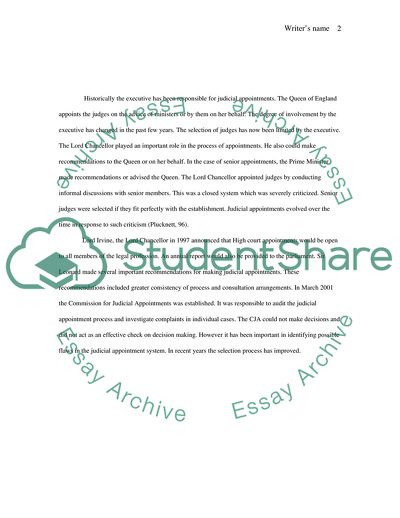Cite this document
(Judicial Appointments Essay Example | Topics and Well Written Essays - 2000 words, n.d.)
Judicial Appointments Essay Example | Topics and Well Written Essays - 2000 words. Retrieved from https://studentshare.org/law/1711380-what-if-any-do-you-see-as-the-weeknesses-of-the-current-system-for-making-appointments-to-the-higher-judiciary-how-could-the-system-be-improved
Judicial Appointments Essay Example | Topics and Well Written Essays - 2000 words. Retrieved from https://studentshare.org/law/1711380-what-if-any-do-you-see-as-the-weeknesses-of-the-current-system-for-making-appointments-to-the-higher-judiciary-how-could-the-system-be-improved
(Judicial Appointments Essay Example | Topics and Well Written Essays - 2000 Words)
Judicial Appointments Essay Example | Topics and Well Written Essays - 2000 Words. https://studentshare.org/law/1711380-what-if-any-do-you-see-as-the-weeknesses-of-the-current-system-for-making-appointments-to-the-higher-judiciary-how-could-the-system-be-improved.
Judicial Appointments Essay Example | Topics and Well Written Essays - 2000 Words. https://studentshare.org/law/1711380-what-if-any-do-you-see-as-the-weeknesses-of-the-current-system-for-making-appointments-to-the-higher-judiciary-how-could-the-system-be-improved.
“Judicial Appointments Essay Example | Topics and Well Written Essays - 2000 Words”. https://studentshare.org/law/1711380-what-if-any-do-you-see-as-the-weeknesses-of-the-current-system-for-making-appointments-to-the-higher-judiciary-how-could-the-system-be-improved.


